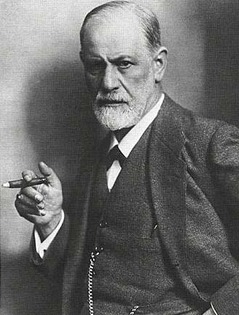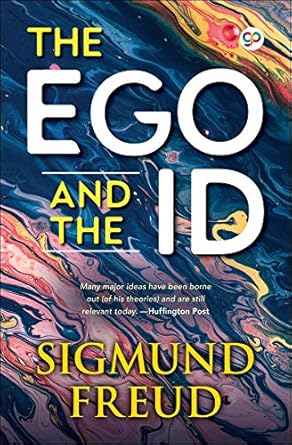Learn more
Your Memberships & Subscriptions

Download the free Kindle app and start reading Kindle books instantly on your smartphone, tablet, or computer - no Kindle device required.
Read instantly on your browser with Kindle for Web.
Using your mobile phone camera - scan the code below and download the Kindle app.

The Ego and the Id Kindle Edition
In this book, The Ego and the Id, Sigmund Freud delves deeper into the concepts of the human mind and the results of the conflicts and workings between them. All human behaviors and traits, according to this 1923 study, derive from the complicated interactions of three elements of the psyche: the id, the ego, and the superego. Freud claimed these components of the human psyche controlled all processes of personality, behaviors, and traits in a person. The Id was a person’s most basic and impulsive instincts—the ones that feed into our deepest desires and physical needs. The Super-Ego was the opposite of the id. This component controlled our highest morals and standards, operating through our conscience and making us desire to be our most ideal-selves. The piece in the middle is the Ego. The ego mediates between the id and realities of the world around us, while being supervised (and guilted) by the super-ego.
About the Author:
Sigmund Freud, (born May 6, 1856, Freiberg, Moravia, Austrian Empire [now Příbor, Czech Republic] - died September 23, 1939, London, England ), Austrian neurologist and the founder of psychoanalysis. Freud may justly be called the most influential intellectual legislator of his age. His creation of psychoanalysis was at once a theory of the human psyche, a therapy for the relief of its ills, and an optic for the interpretation of culture and society. Despite repeated criticisms, attempted refutations, and qualifications of Freud’s work, its spell remained powerful well after his death and in fields far removed from psychology as it is narrowly defined.
- LanguageEnglish
- PublisherGENERAL PRESS
- Publication dateJanuary 30, 2020
- File size721 KB
Customers who bought this item also bought
Editorial Reviews
Review
- "Where id is, there shall ego be"
- "In many criminals, especially youthful ones, it is possible to detect a very powerful sense of guilt which existed before the crime, and is therefore not its result but its motive. It is as if it was a relief to be able to fasten this unconscious sense of guilt on to something real and immediate."
- "It is easy to show that the ego ideal answers to everything that is expected of the higher nature of man. As a substitute for a longing for the father, it contains the germ from which all religions have evolved."
- "It only too often yields to the temptation to become sycophantic, opportunist and lying, like a politician who sees the truth but wants to keep his place in popular favour."
― Sigmund Freud, The Ego and the Id
About the Author
Product details
- ASIN : B084CZ9PHC
- Publisher : GENERAL PRESS; 1st edition (January 30, 2020)
- Publication date : January 30, 2020
- Language : English
- File size : 721 KB
- Text-to-Speech : Enabled
- Screen Reader : Supported
- Enhanced typesetting : Enabled
- X-Ray : Not Enabled
- Word Wise : Enabled
- Best Sellers Rank: #2,274,862 in Kindle Store (See Top 100 in Kindle Store)
- #527 in Behavioral Psychology (Kindle Store)
- #612 in Psychology Research
- #911 in Behaviorism Psychology
- Customer Reviews:
About the author

Sigmund Freud was born in 1856 in Moravia; between the ages of four and eighty-two his home was in Vienna: in 1938 Hitler's invasion of Austria forced him to seek asylum in London, where he died in the following year.
His career began with several years of brilliant work on the anatomy and physiology of the nervous system. He was almost thirty when, after a period of study under Charcot in Paris, his interests first turned to psychology, and another ten years of clinical work in Vienna (at first in collaboration with Breuer, an older colleague) saw the birth of his creation, psychoanalysis. This began simply as a method of treating neurotic patients by investigating their minds, but it quickly grew into an accumulation of knowledge about the workings of the mind in general, whether sick or healthy. Freud was thus able to demonstrate the normal development of the sexual instinct in childhood and, largely on the basis of an examination of dreams, arrived at his fundamental discovery of the unconscious forces that influence our everyday thoughts and actions.
Freud's life was uneventful, but his ideas have shaped not only many specialist disciplines, but the whole intellectual climate of the last half-century.
Customer reviews
Customer Reviews, including Product Star Ratings help customers to learn more about the product and decide whether it is the right product for them.
To calculate the overall star rating and percentage breakdown by star, we don’t use a simple average. Instead, our system considers things like how recent a review is and if the reviewer bought the item on Amazon. It also analyzed reviews to verify trustworthiness.
Learn more how customers reviews work on AmazonCustomers say
Customers find the book provides interesting insights into the inner workings of the mind. They say it's an important read for understanding modern analyses of the human psyche. However, some customers find the font size too small and the word selection excessively complex. The spacing between lines is also too narrow, making reading difficult.
AI-generated from the text of customer reviews
Customers find the book informative and useful for understanding modern analyses of the human psyche. It provides an overview of different external factors like fear of death, melancholia, and their impact on the mind. While some words are unclear, it provides a good understanding of a complex process.
"...concepts are difficult to grasp at times but the interplay between different mental faculties and response generated because of different types of..." Read more
"Good ideas though some words are undefined such as object-cathexis and it was hard for me to determine whether there was a difference between ideal..." Read more
"Required reading for my personality of psychology class. Book was priced well and shipped quick!..." Read more
"...Very interesting." Read more
Customers appreciate the book's good price.
"Required reading for my personality of psychology class. Book was priced well and shipped quick!..." Read more
"...There are some paperback reprints that are perfect. They're also worth the money." Read more
"Great quality of service, specially the price! Thx!! :)" Read more
Customers find the book difficult to read due to small font, phrasing that feels unnecessarily complex, and undefined words. They also mention the spacing between lines is too small, making it hard to follow the text. Overall, readers feel the book lacks clarity and is unsatisfying.
"Good ideas though some words are undefined such as object-cathexis and it was hard for me to determine whether there was a difference between ideal..." Read more
"...Maybe it doesn't translate well, but the phrasing and word selection feels unnecessarily complex...." Read more
"...The letters are so small and then the background space(empty space) is so big.i was wondering who got paid for such an atrocious job...." Read more
"...I took another look at it. Its still very runon-ish, and kinda difficult to read, but its not that bad. Very interesting." Read more
Reviews with images
'
Top reviews from the United States
There was a problem filtering reviews right now. Please try again later.
- Reviewed in the United States on June 4, 2021The book provides overview of different external factors like fear of death, melancholia, and their relation to ID, ego, and superego. Some of these concepts are difficult to grasp at times but the interplay between different mental faculties and response generated because of different types of stimulus is analyzed in this book, which was interesting.
- Reviewed in the United States on February 6, 2014Good ideas though some words are undefined such as object-cathexis and it was hard for me to determine whether there was a difference between ideal and id.
- Reviewed in the United States on December 8, 2023Good
- Reviewed in the United States on November 29, 2023It's Sigmund Freud so unless you understand narcissism fluently, you may struggle understanding some of the topics.
- Reviewed in the United States on September 18, 2023I persevered to get through this but Freud is a difficult read. Maybe it doesn't translate well, but the phrasing and word selection feels unnecessarily complex. Still, some interesting ideas presented thst are worth further exploration and discussion. Don't think I'll be reading direct from the source again though.
- Reviewed in the United States on December 23, 2012I studied Psychiatry and Psychology when trianing to be a nursesonme 35 yers ago so i know about the subject matter. It is about Sigmund Frued the most celebrated Psychiatrist in history next to Jung.who was one of his pupils and confidents. If you want to learn about early human development this is a book to read. Once again it is relatively short for those who can not sustain concentration for a more lengthy book.
- Reviewed in the United States on January 12, 2013Required reading for my personality of psychology class. Book was priced well and shipped quick! This is the same book required the cover is just different.
- Reviewed in the United States on December 26, 2014If I could give 'no stars',I would.I am not complaining abut the content of book but the font used by the publisher is ridiculous.The letters are so small and then the background space(empty space) is so big.i was wondering who got paid for such an atrocious job.I have never seen anything like this.It seemed to me to be akin to some kind of prank.If this book was written properly I would purchase it from another publisher.A altogether terrible job which could have been easily rectified by someone in charge.I have never seen anything like this in my life so I have included pictures to show.
 If I could give 'no stars',I would.I am not complaining abut the content of book but the font used by the publisher is ridiculous.The letters are so small and then the background space(empty space) is so big.i was wondering who got paid for such an atrocious job.I have never seen anything like this.It seemed to me to be akin to some kind of prank.If this book was written properly I would purchase it from another publisher.A altogether terrible job which could have been easily rectified by someone in charge.I have never seen anything like this in my life so I have included pictures to show.
If I could give 'no stars',I would.I am not complaining abut the content of book but the font used by the publisher is ridiculous.The letters are so small and then the background space(empty space) is so big.i was wondering who got paid for such an atrocious job.I have never seen anything like this.It seemed to me to be akin to some kind of prank.If this book was written properly I would purchase it from another publisher.A altogether terrible job which could have been easily rectified by someone in charge.I have never seen anything like this in my life so I have included pictures to show.
Images in this review
Top reviews from other countries
 Dr Joyita MazumderReviewed in India on September 16, 2021
Dr Joyita MazumderReviewed in India on September 16, 20215.0 out of 5 stars Must read
One should read it to know oneself
 Adrian AkbariReviewed in the Netherlands on January 17, 2020
Adrian AkbariReviewed in the Netherlands on January 17, 20205.0 out of 5 stars Amazing book
Wow! One of the most amazing books I have ever read. One cannot cast light on psychoanalysis better than Freud. Coming from eastern roots and having read eastern schools of thoughts, I realized Freud explain the soul of religions in a western language. Language understandable fpr materialistic culture.
 JenniferReviewed in the United Kingdom on June 21, 2017
JenniferReviewed in the United Kingdom on June 21, 20175.0 out of 5 stars Exciting content
Great book, note that it is quite thin but filled with great Freudian content! The language is quite advanced and complex but great for Psychology students.
 Dylan RuthReviewed in Canada on May 20, 2016
Dylan RuthReviewed in Canada on May 20, 20165.0 out of 5 stars Only good things to be said
Got here quick and if you know anything about Freud you'll know that you're in for an enriching read.
 Gareth MasonReviewed in the United Kingdom on November 8, 2019
Gareth MasonReviewed in the United Kingdom on November 8, 20195.0 out of 5 stars The more you read on this subject the better you will understand the states of the mind
Not a bad little book considering the size of it, packed with some good guidance. The more you read on this subject the better you will understand the states of the mind, keep reading the book every so often and you will learn it also unconsciously and will be amazed at how much you understand, of it when you pick it up again. That is how our minds work...








